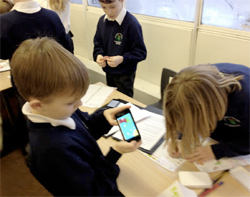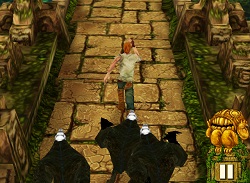Teaching can be a strange thing, you can plan a lesson to within an inch of your life, you can create resources and finely tune the learning objective, but sometimes some of the best lessons can be those that you didn’t plan or even create an objective for. This is one of those lessons. It was our termly celebration day, where parents are invited in to share their children’s work from the term, and we had just come to the end of the sharing with an hour still left of the day. I had a class of expectant parents with little to do. “Right,” I thought, and pulled a bit of gamification out of the bag.
In the business world, gamification has become something of a buzzword. The idea is to take elements from digital games and add it to enhance a customer’s experience. In consumer websites and mobile applications, this can mean digital badges, leaderboards to track scores, levels to unlock, and other reward mechanisms.
Academics from the University of Leicester have been working with local Primary schools to research and develop pupils’ understanding of the law. Law in Children’s Lives is being touted as the first research project of its kind, and aims to explore children’s “understanding and opinions on issues such as gender equality, bullying, consumer rights and duty of care”. Researchers hope to use results to influence government policy in these areas.
Gaming seems to be more popular than ever. As a child of the late Seventies, just BEFORE Space Invaders, video gaming has become a phenomena since the turn of this century. Even as some were worrying about the Millennium Bug, others could not have been more immersed in computing. 2000 saw Sony launch the PlayStation 2 for a staggering $299.99 (£150); with a built-in DVD player and back compatibility with PS1 games; every one of the 500,000 consoles produced sold out on Day 1. Following this, the only bug associated with computers was the sweeping-craze for gaming. 2008 saw the first ‘Video-game Tournaments’, as video-games became a fast-growing spectator sport with big tournaments like Unreal (held at Wembley Stadium) and the Championship Gaming Series (USA). Now eSports tournaments like the MLG have millions of registers users, with winners gaining millions of dollars for one video-game.

The opportunities for learning through the use of digital gaming are diverse and massive. The speed and ease in which basic game development can be achieved using apps such as Sketch Nation can provide a platform for outstanding cross-curricular projects and really make an impact on progress, standards and pupil independence.
This blog post describes one project (upper KS2) which could easily be adapted to suit Key Stage 1 or expanded to meet the needs of Key Stage 3 pupils, and to support almost any topic/subject. 1:1 use of iPods enabled maximum pupil engagement but fewer devices could have been used if pupils collaborated in groups.
Teacher and ICT coordinator Lee Parkinson explains how popular games such as Temple Run can actually be used as a disguised method of learning, rather than a simple incentive, hence the term 'camouflaged learning'. With so many aspects of maths, English and science already incorporated within games (scores, coins, trajectory, gravity, words) and a huge potential for post-play learning to be done with numbers, vocabulary, concepts etc., teachers can potentially use any game as a learning tool.

I have found I use iPads in two major ways within the classroom: as a tool to engage and as a tool to create.
In most of the projects I have completed with the children this year, I have tried to combine both these elements to get the best work from the children. Firstly, using the iPad to provide a focus to use in lessons has had a massive impact as far as engaging children, motivating them and leading them into a 'false sense of learning'.
The idea that children are learning by doing activities where they feel they are 'playing' is something I am always trying to promote. It is the perfect way to get disengaged or reluctant learners on board and almost trick them into writing, reading and solving problems. Nothing sums this phrase up more than the work produced by children when the focus has been the iPad games they are obsessed with - Angry Birds and Temple Run.
Photo credit: Themeplus

A community-driven platform for showcasing the latest innovations and voices in schools
Pioneer House
North Road
Ellesmere Port
CH65 1AD
United Kingdom